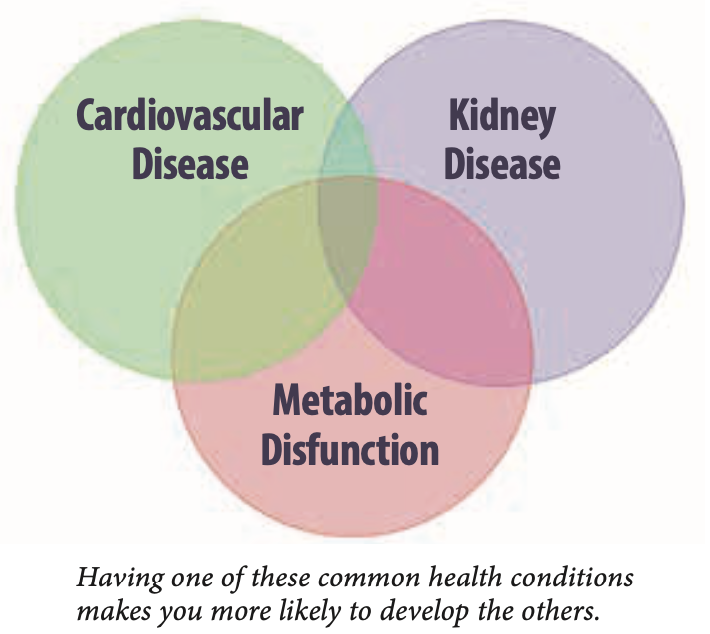CKM Syndrome: The Triple Threat to Heart, Kidney & Metabolic Health
Your heart, kidneys, and metabolic system are intricately connected. When one begins to fail, the others often follow. This dangerous health link is now medically recognized as CKM Syndrome—a condition that combines cardiovascular disease, chronic kidney issues, and metabolic disorders like type 2 diabetes and obesity.

Let’s explore CKM Syndrome in detail, including what causes it, warning signs to watch for, and how to prevent or manage it effectively.
What is CKM Syndrome?
CKM Syndrome stands for Cardiovascular-Kidney-Metabolic Syndrome—a recently identified health condition that’s raising red flags among global health experts. According to Dr. Bipeenchandra Bhamre, a leading cardiac surgeon, CKM is not just one disease, but a cluster of interconnected conditions:
-
Heart disease (cardiovascular issues)
-
Chronic kidney disease (CKD)
-
Metabolic disorders such as obesity, insulin resistance, and type 2 diabetes
Together, these conditions can deteriorate your overall health and dramatically increase your risk of severe outcomes, including:
-
Heart attacks and strokes
-
Kidney failure
-
Early death
Why CKM Syndrome Is So Concerning
Unlike individual chronic conditions, CKM Syndrome creates a systemic health crisis. Each affected system adds stress to the others, creating a dangerous cycle. When the heart, kidneys, and metabolism function poorly as a group, the body can’t regulate pressure, fluids, blood sugar, or fat properly—which increases lifelong health risks.
“CKM can silently damage multiple organs at once, leading to long-term complications that people often overlook until it’s too late,” warns Dr. Bhamre.
Causes of CKM Syndrome
Several lifestyle and environmental factors combine to trigger CKM syndrome. The most common causes include:
CKM Syndrome Causes
-
Uncontrolled blood sugar (diabetes or prediabetes)
-
High blood pressure (hypertension)
-
Excess belly fat or obesity
-
Sedentary lifestyle with limited physical activity
-
Unhealthy diet high in sugar, sodium, and trans fats
-
Smoking and excessive alcohol intake
-
Family history of heart, kidney, or metabolic disorders
If more than one of these factors is present, the risk of developing CKM syndrome increases significantly.
Symptoms of CKM Syndrome to Watch For
CKM Syndrome often develops quietly and gradually, making early detection tricky. Here are key symptoms that may indicate your heart, kidneys, or metabolic systems are under stress:
Common CKM Symptoms
-
Persistent fatigue and shortness of breath
-
Swelling in legs or ankles due to fluid retention
-
Elevated blood pressure or blood sugar
-
Unexplained weight gain or difficulty losing weight
-
Frequent nighttime urination
-
Chest pain or discomfort
If you experience more than two of these issues regularly, it’s time to consult your doctor for a full check-up, including kidney function tests, blood sugar levels, and lipid profile.
Treatment & Management of CKM Syndrome
There is no one-size-fits-all solution for CKM Syndrome. It requires a comprehensive, multidisciplinary approach involving cardiologists, nephrologists, endocrinologists, and dietitians.
Key Lifestyle Changes
-
Eat a clean, balanced diet rich in fiber, healthy fats, and low in refined sugar and salt
-
Exercise for at least 45 minutes a day—walking, yoga, strength training, or swimming
-
Limit alcohol and quit smoking completely
-
Avoid junk food like fried snacks, processed meat, and sugary drinks
Medical Monitoring & Tests
-
Regular blood pressure checks and blood sugar monitoring
-
Annual kidney function tests (creatinine, GFR, urine protein)
-
Lipid profile to monitor cholesterol levels
-
Take prescribed medications like antihypertensives, antidiabetics, or statins—as directed
Prevention is the Best Strategy
The best way to deal with CKM Syndrome is to prevent it before it starts. If you have a family history of heart or metabolic disorders, start practicing preventive care early.
Simple Steps for Prevention:
-
Don’t ignore early signs like frequent fatigue, bloating, or weight gain
-
Choose whole foods over packaged options
-
Practice mindful eating and avoid late-night meals
-
Stay hydrated and aim for quality sleep every night
-
Schedule routine health checkups—even if you feel fine
Final Thoughts
CKM Syndrome may be a relatively new term in medicine, but its impact is real and growing. With sedentary lifestyles, poor nutrition, and rising rates of diabetes and obesity, more people are unknowingly falling into the risk zone.
By understanding the connection between your heart, kidneys, and metabolism, you can take meaningful steps today to stop long-term damage and improve your quality of life.
Your health is interconnected—protect all parts of it as one.